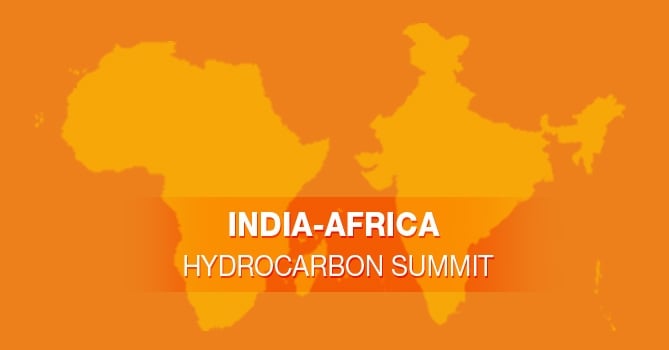When India recently held a two-day hydrocarbon summit with Africa, it was unambiguously clear that New Delhi organized it with two objectives in mind: First, energy security and second, uncertainty and tension in the Middle-East and its impact on oil supply in the future. For the energy deficient country, a mix of energy sources that include oil, natural gas, coal, biomass, hydropower, nuclear and renewable energy is used to carry on economic growth. In this energy mix, share of oil and gas is 22 and 8 per cent respectively. As per the International Energy Agency, India will contribute around 25 per cent of the growth in global energy demand in the next few years. New Delhi’s long-term strategic planning and investment to meet its growing energy demand was apparent when it held India-Africa hydrocarbon summit.
In 2014, India imported 32 million metric tones of crude oil from Africa, including 3 million metric tones from North Africa and 29 million metric tones from West Africa, mainly from Angola and Nigeria. By 2020, India’ share of oil import is expected to almost double the amount of supplies coming from Africa.
At the moment, Middle-East is the key supplier of crude oil to India. Last year, India imported 61 per cent–nearly 190 million metric tones crude oil from the Middle East, 17 per cent from South America, approximately 16 per cent from Africa and 0.1 per cent from Russia. But India, aware of the fast changing geopolitical situation in the world and also its own growing requirement in the coming days, has decided to diversify its crude oil procurement plan.
This objective was clear when New Delhi organized fourth India-Africa hydrocarbon summit. Participated by 22 oil and gas-producing African nations, the hydrocarbon summit enabled both sides to further deepen their scope of collaboration in exploration of gas and oil and their trade. It should be noted that India has been importing oil and gas from Africa for quite a long time, but structural shape to their engagement on hydrocarbons was given in 2007 when they held the first hydrocarbon summit. Since then, both sides have not looked back. This can be evaluated from the fact that the two-way trade between India and Africa accounted for $75 billion in 2014. Of this, a lion share came from oil bill–over $40 billion.
In African countries like Mozambique, Sudan and South Sudan, India’s ONGC-Videsh Limited (OVL) and Oil India Limited (OIL) have so far invested up to $ 8 billion in exploration and production segments. Navratna OIL and Indian Oil Corporation (IOC) are jointly engaged in exploration in Shakti Block in Lamberele in Gabon, while it is Ghadames basin in the Southwestern part of Libya, Indian companies like IOC are involved in exploration business. In 2013, 41 million barrel oil was explored by Indian companies from Gabon’s Shakti Block. Similarly, Indian companies have renewed its exploration bid in Egypt, the North African nation which supplied over $2 billion worth of crude oil to India last year.
Over all, India which is the fastest growing economy of the world with Gross Domestic Product over 7 per cent will require huge amount of crude oil to run the engine of growth. Alone to sustain ‘Make in India’ initiative-a brainchild of Prime Minister Narendra Modi, New Delhi will require unchecked supply of both crude oil and gas to propel the program. As per an estimate, India’s crude oil imports which are 76 per cent now, will reach 90 per cent by 2030. To meet this, New Delhi will have to look towards resource rich Africa which has over the past few decades witnessed new discoveries in oil reserves growing by more than 100 per cent and gas reserves growing by over 55 per cent. It is said that while oil production in the Gulf and the West Asian region will plateau in the next 25-30 years, Africa will continue to thrive on its fossil fuel sources in the next 50-60 years. Otherwise too, given the rise in India-Africa ties, a sense growing strongly among Indian decision makers is that no country or continent would be as perfect partner of India as Africa in the hydrocarbon space. India’s scarcity of domestic energy resources can find solution in Africa’s surplus energy reserves.
Read More:
- Best Cities in the World to Launch Startups
- Where is the Chinese Economy Headed?
- $6.5 billion Cash Deal: Argentina’s Answer to Debt Battle
- Why is Norway the Best Place to Live In?
- Oil Prices and the Global Economy
- Self-made Young Entrepreneurs of the Decade
- Is the World Economy in Trouble?
- Rich People Around the World
- India-Africa hydrocarbon summit: Strengthening ties
- Money Around the World

